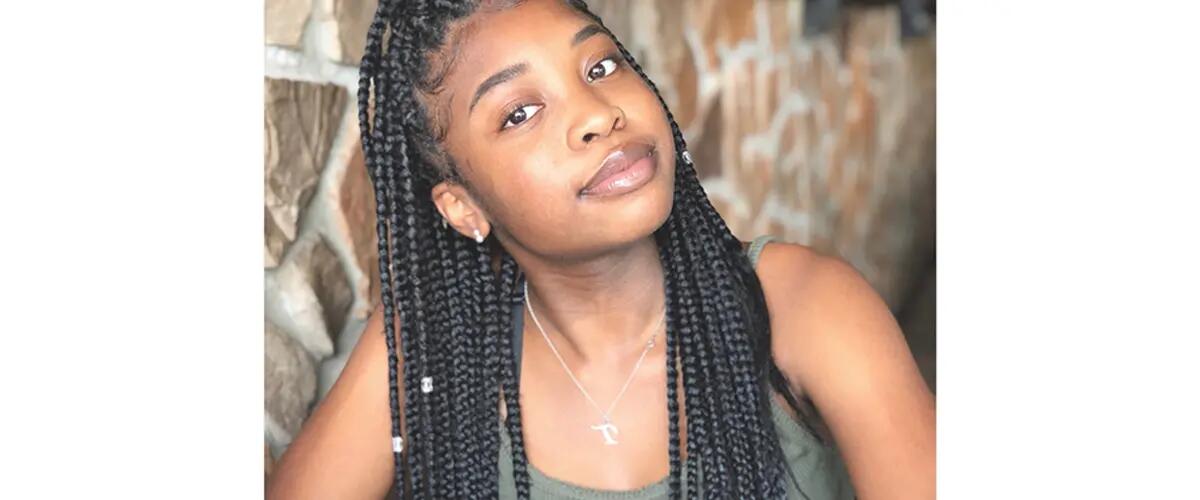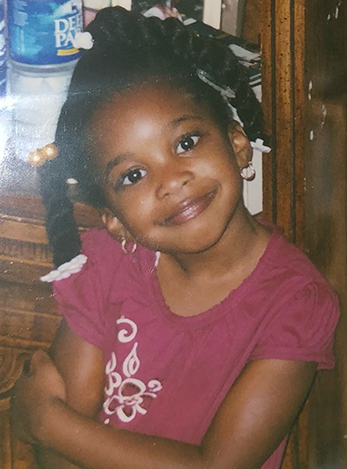
Tenille Grant
RBS Voices: Empowered by movement, student creates a safe space, some solace in solidarity
By Tenille Grant
Growing up in a loving and welcoming household has given me the support I need to ground myself in my academic endeavors. My family background is one that is centered around faith. I was taught to treat everyone with kindness and respect no matter their race, ethnicity, or religious affiliation. As I continued to learn more about the world, I soon found that not everyone held these ideals. I learned about the reality of discrimination.
As I became more aware of social justice issues and issues within the Black community and Black diaspora, I began to understand what it meant to be Black in America. I took three classes in high school that exposed me to history and current systemic injustices that continue to plague the Black community. My passion for social justice, equality, and equity grew exponentially. I am now pursuing a social justice minor within the Honors Living Learning Community.
As Black Lives Matter protests and outcries for social reform flooded social media outlets, I was hurt and distracted by the videos and posts of disgraceful injustices that inspired them. From George Floyd to Breonna Taylor to countless others, the Black community has been stung by these deaths and the lack of prudence and non-condemnation by government leaders. As I attended a vigil for George Floyd and a public protest and marched in my neighborhood, I felt empowered. I felt like my voice was important and that it could be used to do some great good. I also felt saddened and broken, broken because the constant deaths of innocent Black men and women are infuriating and deeply saddening as any of these people could have been my own family or myself.
As a 2020 B-STAR freshman student at Rutgers Business School, I met new friends that looked a lot like me during the program’s summer session. As the terrors of 2020 battered the public, I became triggered and sensitive to topics concerning issues within the Black and global community. Conversations occurred in an informational B-STAR enrichment session, which led to discourse concerning race and social justice. After the session, I felt the need to gather a few of my friends from the B-STAR group as well as my personal friends from my neighborhood to further discuss and assess our emotions as they pertain to racial injustice and the response of the Black Lives Matter movement, and especially for us, the mistreatment of and stigmas that exist about Black women.
I felt the need to create a safe place where my friends, classmates, and I could have conversations regarding microaggressions towards Black women, as well as situational subtleties that are too often racist, biased, and insensitive. Our first conversation was only to be an hour over Zoom; however, my friends and I were on fire. We discussed colorism, police brutality, racism, racial bias, discrimination in schools, the school to prison pipeline, mass incarceration, prejudice against Black men, discrimination in the workplace, and so many more important topics. I soon coined our conversations as "Ted Talks: Issues and Microaggressions Within the Black Community." We had two more "Ted Talks," which really helped my friends and I to express our sentiments and our anger towards systemic racism. These conversations, even though they were incredibly serious, made me smile. I felt like I had a place to embrace my thoughts while being surrounded by beautiful minds that supported one another.
My background inspires me, and my family's hardships have shaped me into who I am today. Every generation of my family has tried to improve themselves and improve the lives of the next generation. My great grandparents were sharecroppers in Virginia, who decided to leave and made their way to Brooklyn to find better economic opportunities to provide for their five children. My great grandfather began working in a coal mine and later became an entrepreneur. My grandmother was involved in a sit-in at Jersey City State College, now known as New Jersey City University, during the Civil Rights Movement. Additionally, I have been inspired by my Jamaican grandmother, who created a bus stop for the people in her community in Jamaica. She also made recreational and communal activities to get the neighborhood to come together and service their community.

I come from a lot of strength and humility. I believe it would be selfish to take this educational opportunity of being a part of such a prestigious school at Rutgers Newark for granted. A school that really is the epitome of racial inclusivity, which is one of the main reasons I decided to attend this school above any others. Coming to Rutgers Newark allowed me to feel comfortable in higher education because I would be able to attend a school where my race is adequately represented amongst the student body. Rutgers Business School's Office of Inclusion, Diversity, Equity and Access fostered uncomfortable conversations pertaining to microaggressions and the concept of race and racism. I felt comfortable expanding on the conversation because I could identify with students within the B-Star program. Without this environment, it would have been much harder to feel secure sharing my views.
These unprecedented times regarding social justice are a time of movement, reform, and education. The momentum that has been sparked by police brutality, civil unrest, and many protests and marches will drive this country forward. This is a time when many issues are mainstream, live, discussed, reposted, and tweeted. I find it incredibly empowering to see people of all races and ethnicities taking a stance and voicing their opinions via their social media platforms for all to see. Systemic oppression is real, and in my opinion, the course of action that needs to be taken is to repeal laws that continue to keep Black people at the bottom of the social, political, and economic stratospheres in this country.
I realize that social and economic disparities will remain in communities of color for some time even if we may be at an important inflection point. I am passionate about helping children who are not afforded the same opportunities as others. I want to be able to target the educational system and the building of wealth in these areas by opening a nonprofit after-school service. My vision includes building and launching an after-school center for all students in an area designated based on need. Many programs would be offered there, including athletic programs, arts and sciences programs, general education assistance, and wealth-building classes. I want to be a part of building up young minds today, to build a better tomorrow.
RBS Voices is a new feature intended to give members of the Rutgers Business School community a chance to express their views on race relations, racial inequality, the Black Lives Matter movement, and other issues of our time. Follow the series on social media: #RBSvoices.
Press: For all media inquiries see our Media Kit


